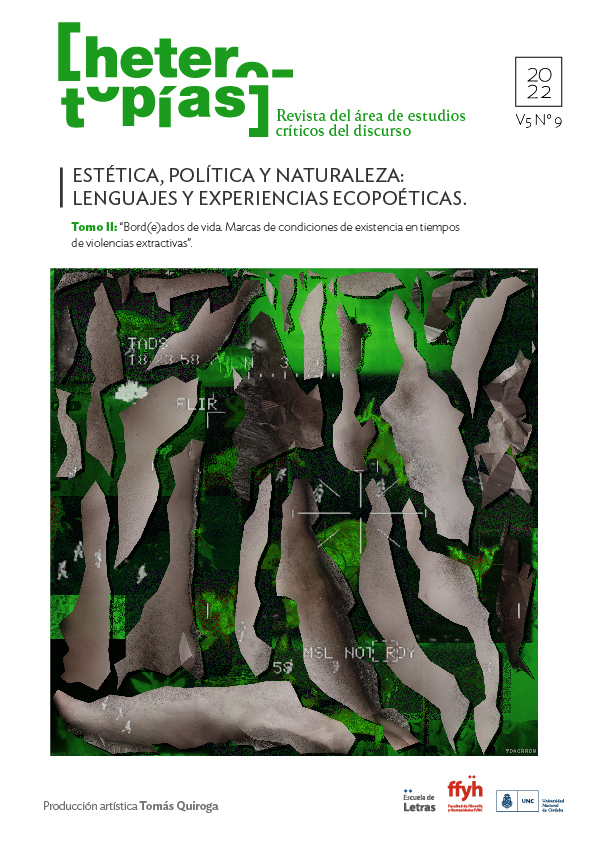From lack of air to photosynthesis: Affections, city and nature in Memoria del aislamiento
Main Article Content
Abstract
With the Covid-19 pandemic, the performing arts had to completely change their proposals and the same happened with activism. Between artistic activism and performance art, the Relato situado project (started in 2015) of the Compañía de Funciones Patrióticas is a worthy case to think of current issues. In 2020, in addition to a virtual edition of Barrios por la memoria, they created Memoria del aislamiento, which featured monthly editions. The performance is offered as a testimony of isolation and exposes consciousness of its archive qualities. The experience of the everyday life and the return to the natural in the daily life of the city are elements to think of in these performances.
In this article I will focus on the final performance piece, since the montage makes possible to take a trip through the confinement, and it also allows a specific approach based on the connection between creation, city and nature. The performance pieces of the last edition offer a journey through the whole year 2020 and the experience of the four seasons organizes the audiovisual performance, which we could then define as a natural-urban calendar. The common thread is expressed through a return to nature in the experience of everyday life in the city. That is to say, the performances expose the creative power of the everyday life and the relationship with nature stands out as a looking for sun, the need of photosynthesis, the return to the animal and the presence of elements such as fire, sky, water, air. In consequence, the performance appears as an affective and natural calendar. That is why we will use the elements of theories of affect to analyze the relationships between art, experience and nature.
Downloads
Article Details

This work is licensed under a Creative Commons Attribution-NonCommercial-ShareAlike 4.0 International License.
Those authors who have publications with this journal, accept the following terms: Those authors who have publications with this journal, accept the following terms:
a. The authors will keep their copyright and guarantee to the journal the right of first publication of their work, which will be simultaneously subject to the Creative Commons Attribution - Non-Commercial - Share Alike (by-nc-sa) Attribution License; no commercial use of the original work or any derivative works is allowed, the distribution of which must be done with a license equal to the one that regulates the original work.
b. Authors may adopt other non-exclusive license agreements for the distribution of the published version of the work (e.g., deposit it in an institutional telematic archive or publish it in a monographic volume) provided that the initial publication in this journal is indicated.
c. Authors are allowed and recommended to disseminate their work through the Internet (e.g. in institutional telematic archives or on their website) before and during the submission process, which may lead to interesting exchanges and increase the number of citations of the published work. (See The effect of open access).
How to Cite
References
Ahmed, S. ([2004] 2017). La política cultural de las emociones. México: PUEG- UNAM.
Compañía de Funciones Patrióticas (28 de abril, 2021). Relato Situado. Memoria del Aislamiento (7). [Archivo de video]. Recuperado de https://www.youtube.com/watch?v=M7vIjie8gp4
Debord, G. (1999) Teoría de la deriva. En Internacional situacionista, vol. I: La realización del arte. Madrid: Literatura Gris.
Donoso, C. (2020). “Historia pública de una casa: hogares, encierros, refugios”. En Proaño-Gómez, Lola y Lorena Verzero (comps. - eds.). Mutis por el foro. Artes escénicas y política en tiempos de pandemia, (pp. 157 a 165). Buenos Aires: ASPO. Libro digital disponible en: https://bit.ly/MutisPorElForo
Foucault, Michel (1977 [2007]). Historia de la sexualidad 1. La voluntad de saber (31a. edición). México: Siglo XXI.
Rolnik, S. (2019). Esferas de la insurrección. Apuntes para descolonizar el inconsciente. Traducción de Cecilia Palmeiro; Marcia Cabrera; Damián Kraus. Buenos Aires: Tinta limón.
Verzero, L. (2020a). “Cartografía afectiva de la patria: Relatos situados, la ciudad palimpsesto”. En Cecilia Sosa, Jordana Blejmar y Philippa Page (coords.). Entre/telones y pantallas. Afectos y saberes en la performance argentina contemporánea, (pp. 150-171). Buenos Aires: Libraria.
Verzero, L. (2020b) “La afectividad como experiencia política: Avatars del artivismo en el ágora contemporánea”. En Proaño-Gómez, Lola y Lorena Verzero (comps. - eds.). Mutis por el foro. Artes escénicas y política en tiempos de pandemia (pp. 104-119). Buenos Aires: ASPO. Libro digital disponible en: https://bit.ly/MutisPorElForo
Verzero, L. (2021). “Espacios, pandemia y afectos: corporalidades en/para las nuevas ágoras”. En María Lucía Puppo (ed.). Espacios y emociones. Textos, territorios y fronteras en América Latina, (pp. 289-306). Buenos Aires: Miño y Dávila.
Verzero, L. (2022). “La afectividad como experiencia política: Avatars del artivismo en el ágora contemporánea”. En De Petris Chauvin, Irene y Natalia Taccetta, Performances afectivas. Arte y modos de lo común en América Latina (en prensa). Buenos Aires: La Cebra.
VVAA (2020). Sopa de Wuhan. Pensamiento contemporáneo en tiempos de pandemias. Buenos Aires: ASPO. Versión digital del libro disponible en: https://www.elextremosur.com/files/content/23/23684/sopa-de-wuhan.pdf
